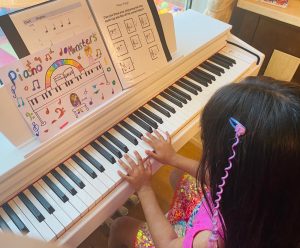Like it or not, ABRSM music exams are very much a part of our culture in the UK. Children are accustomed to being assessed from a very young age, and exams are seen as a recognised marker for progress – whatever the subject. Music lessons are often no different. At Music Monsters, we always offer the option of following a pathway of no exams, which can be very effective for many children – especially those who are already struggling under the pressure of dozens of other assessments, or those who get very nervous. Their progress can be just as rapid (often more so), as long as there are other motivations to keep them moving forward.

However, the majority of children and their parents like to stick to what they know – ABRSM music exams sat at regular intervals to show a clear path of progression, and to demonstrate that the money and time being put into lessons is indeed paying off. Once this has been established, the next question on most people’s lips is: how long does it take to pass an ABRSM music exam?
What does an ABRSM Music exam involve?
An ABRSM music exam is compiled of 4 elements:
- Scales, arpeggios and broken chords. These have to be learned well enough to play with an even tone, at a good tempo, and from memory.
- 3 pieces. These must be played to a performance standard. It is not enough to simply learn the notes and give an accurate performance. They must be played musically, demonstrating a good understanding of style.
- Sight-reading. The student must play a short piece that they have never seen before, after just a very short time to look through it.
- Aural tests. A series of listening tests including singing, pulse recognition, and answering questions about an extract of music
 In order to pass the ABRSM music exam, students must show proficiency in all areas. The exam is structured in such a way that the student must demonstrate a good understanding of all key skills for this grade. They cannot just memorise the scales and pieces. The sightreading and aural tests check that they actually have the knowledge and understanding expected at this grade.
In order to pass the ABRSM music exam, students must show proficiency in all areas. The exam is structured in such a way that the student must demonstrate a good understanding of all key skills for this grade. They cannot just memorise the scales and pieces. The sightreading and aural tests check that they actually have the knowledge and understanding expected at this grade.
Averages
A look at our own piano students shows the following average times taken to pass each exam:
- Beginner to Grade 1 – 23 months
- Grade 1 to Grade 2 – 17 months
- Grade 2 to Grade 3 – 13 months
- Grade 3 to Grade 4 – 11 months
- Grade 4 to Grade 5 – 15.5 months
- Grade 5 to Grade 6 – 18 months
- Grade 6 to Grade7 – 13.5 months
- Grade 7 to Grade 8 – 15 months
 As you can see, there are several exams that have taken longer to achieve. This is due to the larger ‘jumps’ between grades. Grade 5 to 6 especially is quite a big step up. Many students actually stop at grade 5 because they don’t want to sit the required theory exam to allow them to move beyond that. Exams move from ‘intermediate’ at grade 5, to ‘advanced’ at grade 6. There are also UCAS points available for grades 6,7 and 8, which is a reflection of the more serious and difficult nature of these exams.
As you can see, there are several exams that have taken longer to achieve. This is due to the larger ‘jumps’ between grades. Grade 5 to 6 especially is quite a big step up. Many students actually stop at grade 5 because they don’t want to sit the required theory exam to allow them to move beyond that. Exams move from ‘intermediate’ at grade 5, to ‘advanced’ at grade 6. There are also UCAS points available for grades 6,7 and 8, which is a reflection of the more serious and difficult nature of these exams.
This also doesn’t take into account any other things that the students have worked for or achieved in between ABRSM music exams e.g. GCSE/A-levels, Duke of Edinburgh, Grade 5 theory.
The Big Mistake

The big mistake that people make is when calculating time values. The average student has a 30 minute lesson a week. Unfortunately, for many students, this is all the contact time they get with their instrument. This isn’t enough for them to show any real progress. Parents then sometimes wonder why it is taking so long to achieve the next ABRSM music exam.
Practise needs to be regular and consistent. They need to be practising for all parts of the exam, not just the part that their teacher has focused on that week. Many students get carried away practising the piece that they enjoy the most, and other things learned get forgotten. Every student is different, but one thing is true of all of them – they see huge improvements when sticking to a great practise routine!
So How Long Does it take?
This is the killer question! Of course, every student is different, and they will progress at different rates.
I would recommend an average of 20 mins practise, 4-5 times a week, at grade 1. This should then increase in 5 min increments with each grade. This can be spread throughout the week, with a ‘little and often’ approach often proving the most effective! With this amount of practise, and regular lessons, students can expect to sit an average of 1 music exam every year. This will also allow for some extra-curricular learning, enabling students to learn more of the music that they enjoy, and increasing their repertoire list.
Students will be able to learn effectively at this rate, without rushing or panicking towards the end. The important thing is that work is done between lessons. This keeps students motivated and confident in their abilities, which really is the best way to learn. People thrive in environments in which they feel strong and relaxed. Helping them to reach their goals in this way is a sure way for them to keep moving forwards and enjoying their lessons!
Resources to Help
2. Inspiring Musicians’ Practice Journal. An excellent music journal to help you keep track of all your progress as you work towards your exam. Carefully crafted to encourage children to write down their practice goals, this high-quality journal is full of games, challenges, opportunities to win prizes. Suitable for all music students, whichever instrument you are learning.
3. Improve your Scales – Paul Harris. An in-depth look at all the scales you need for any particular grade, with lots of lovely musical examples and extracts that bring the scales to life. A must for any musician who wants to truly build their skills and understanding.

e-book also includes a practice sheet and a special Music Monsters bingo
card, all suitable for little ones from beginners to exam level!
If you would like to know more about our lessons and how we can help you to achieve your goals, please contact info@musicmonsters.co.uk.



